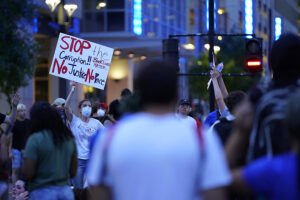NJ Police Use-of-Force Guidelines to Change in Response to George Floyd Tragedy
New Jersey Attorney General Gurbir Grewal announced on June 2, 2020 that the state’s use of force guidelines for police will be revised and updated. This change, the first update to these guidelines in twenty years, comes in response to the most recent publicized death of a Black person in police custody in the US: the May 25th death of George Floyd in Minneapolis.

As part of the revised police guidelines, a mandatory licensing program will be implemented for all officers statewide. This change will bring New Jersey into line with the majority of the nation, as at least 43 other states have some form of licensing requirement already in place for police. This licensing will be comparable with the sort required of other professions that hold a level of responsibility and public trust, such as lawyers and doctors. Other elements of these reforms include the launching of a pilot program in a selection of New Jersey cities, which will implement training programs for police aimed at promoting safe interactions with communities, and the establishment of a statewide database documenting when police use force.
Existing use of force guidelines for New Jersey police were adopted in 2000, and attempt to supplement “the letter of the law” with a set of best practices to help officers respond “appropriately” to situations requiring the use of force. These guidelines have been under scrutiny by the Attorney General’s office since Grewal came into office in 2018, likely in response to the growing strength of the Black Lives Matter movement and its efforts to raise awareness about police brutality. In his announcement on Tuesday, Grewal explained that the timing was “ripe” to roll out this policy change, which had been in the works for some time. The announcements followed from the transparency measures that Grewal implemented in December of last year, part of which involved requiring a faster public release of surveillance video of crimes involving police.
Rather than going through the lengthy and often contentious legislative process to implement these changes, Grewal announced that the new policies will come through regulations and directives from the attorney general’s office. He emphasized that stakeholder input on these policies would be sought, especially with respect to the new use of force guidelines.
Although the death of George Floyd in police custody, the event that prompted Tuesday’s announcement, took place in Minnesota, the impact of the incident has been felt nationwide, including in New Jersey, which has seen dozens of protests. Only two of these demonstrations, in Trenton and Atlantic City, resulted in violence and vandalism; in other towns across the state, local police showed solidarity with protesters. Asbury Park’s protest on Monday saw police kneeling in support of demonstrators against police brutality. Unfortunately, this sense of camaraderie was exhausted later in the evening, when police attempted to enforce the curfew and clear the streets of the approximately 200 people who lingered after the end of the protest. There were a dozen arrests (including a reporter, Gustavo Martines Contreras, who was released Tuesday with a promise from Attorney General Grewal that the charge will be dismissed) and three reported injuries to officers. The 8 PM curfew was not applicable to credentialed members of the media, and Grewal pledged to determine why a reporter was arrested and ensure that the mistake is not repeated.
Thankfully, the peaceful demonstrations in New Jersey have far outnumbered the violent clashes between protesters and police in the state. Another 21 protests were scheduled across the state on Tuesday, including an event in Toms River which saw police walking at the front of a protest march, with the police Chief Mitch Little and his fellow officers bearing a banner emblazoned with the phrase, “We Are With You.” During this protest, demonstrators chanted the words, “I can’t breathe!” to recall the dying words of George Floyd, which carried a chilling echo of Eric Garner, another Black man who died in police custody in 2014 after being put in a choke-hold by police. Floyd’s death followed the actions of a police officer who was recorded pressing his knee into Floyd’s neck for several minutes, persisting even after Floyd had stopped moving and struggling to breathe. That Minnesota officer now faces a charge of third-degree murder.
At a news conference with Gov. Phil Murphy, Attorney General Grewal told the people of New Jersey who had taken to the streets to protest, “…we hear you, we see you, we respect you, we share your anger and we share your commitment to change.” It seems that the revisions to New Jersey’s use of force policy come in the spirit of this commitment to positive change, and we can hope that these new policies represent a step toward ensuring the safety of Black Americans, and all Americans, in all encounters with police.







